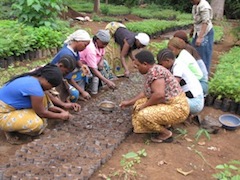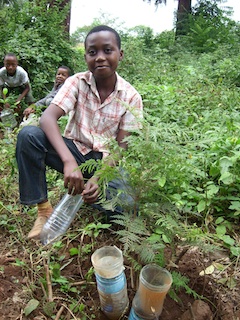|
|
|
|
 |
|
Tanzania
 |
 |
 |
Women's tree nurseries are a vital part of the reforesting programmes in Tanzania |
ARC's faith partners in Tanzania
ARC is working with three faith groups in Tanzania who have developed long-term environmental action plans and were among 26 Christian, Muslim and Hindu faith groups in sub-Saharan Africa that launched long-term environmental action plans at ARC's Many Heavens, One Earth, Our Continent Celebration in Nairobi, Kenya, in September 2012.
Our faith partners include:
Bukoba Catholic Diocese
Northern Diocese of the Evangelical Lutheran Church of Tanzania
The National Muslim Council of Tanzania (BAKWATA)
Read more about their activities below.
Bukoba Catholic Diocese
The Bukoba Diocese of Tanzania sits on the banks of Lake Victoria.
The Catholic Church has 32 parishes in the Bukoba Diocese and 59% of the 860,000 population are Catholics. The Church owns seven nursery, one primary, three secondary and three high schools in the diocese as well as a teachers’ college, four seminaries, four vocational colleges, a university and several health facilities, hotels and restaurants, press and printing houses. It runs an active Catholic Women’s Union and the Catholic Youth’s Union in almost all parishes in the diocese. These diocesan facilities cater for people from all walks of life regardless of faith especially the needy and less privileged.
Since it was formed 120 years ago, Bukoba Catholic Diocese has participated in environment protection work by planting trees on about 2,500 hectares in different parishes and by establishing farming plots in all education institutions owned and run by the Church. These plots have provided food for use at all the church-run institutions but have also been used to demonstrate sustainable land management for other farmers in the neighbourhood.
Long-term Commitment for a Living PlanetThe Diocese has developed a three-year project “to make faith and the Word of God engines for restoration of nature and poverty eradication”.
The project targets women, men and young people who are farmers living in households that cultivate land holdings of two hectares or less and who live within groupings popularly known as small Christian communities within five Catholic parishes.
Agreed future activities will include:
Expanding training on the environment and agroforestry
Setting up up an advisory service for farmers
Developing improved energy sources among smallholder households
Establishing botanical gardens in all Catholic parishes
Expanding activities of young people in environmental issues
To read a summary of the plan, click here.
To read the plan, click here.
 |
 |
 |
Young people attending confirmation classes in the Evangelical Lutheran Church of Tanzania must each plant ten trees before they can be confimed. |
Northern Diocese of the Evangelical Lutheran Church of Tanzania
The Northern Diocese is one of the 20 dioceses of the Evangelical Lutheran Church in Tanzania (ELCT). It has around 400,000 members divided into 152 parishes scattered on the slopes of Mount Kilimanjaro, the highest mountain in Africa, located in the northeastern corner of Tanzania.The Northern Diocese is divided into various departments which include stewardship, planning and development, women, youth and christian education. In its Synod meeting of June 2006, the diocese adopted a policy on environmental conservation calling for intensive tree planting. As a result all young people attending confirmation classes have to plant 10 trees before they are confirmed.
During the past four decades the Kilimanjaro region has seen great destruction of its environment, with deforestation and drought leading to poor harvests, famine and rising poverty. Symbolically, the snowcap that has covered the top of Mount Kilimanjaro for the past 11,700 years is disappearing rapidly due to global warming. The loss of the Kilimanjaro ice fields will carry significant climatatological and hydrological implications for local people.
Long-term Commitment for a Living Planet
The Diocese prepared its 7-year plan for ARC's 2009 Windsor Celebration and it has been used as a model by other faith groups. There are now a well-established network of Parish Environment Committees across all 152 parishes in the region. Future action is very muchcentred on reforestation.
Agreed future activities will include:
Planting at least 8.5 million new trees as community forests
A seminar programme raising awareness of the environmental consequences of deforestation, clay extraction and other practices
Introducing burials that do not rely on unsustainable use of wood and bricks
Establishing new, women-led tree nurseries
To read a summary of the plan, click here.
To read the plan, click here.
National Muslim Council of Tanzania
The National Muslim Council of Tanzania (BAKWATA) is a well-established faith-based Islamic organisation registered since 1968. The Council has branch offices all over Tanzania with a network from the national to grassroots level with 22 regional and 113 district offices served by over 700 sheikhs.
Around 2,800 mosques run under its co-ordination. It owns around 40 acres of land in each of its 22 regions and it has 20 secondary schools, two teachers’ colleges, two theological colleges, and a radio station and support numerous madras schools. From the late 1990s, BAKWATA has organised and facilitated trainings for its Muslim scholars on environmental issues.
Long-term Commitment for a Living Planet
BAKWATA is already engaged in ongoing work on environmental issues including environmental education for madras pupils, environmental education and management clubs in 10 secondary schools owned by BAKWATA and spreading the use of environmental theological materials in religious ceremonies and sermons on Friday prayers. A handbook for madrassas on Islamic teachings on environment management has been drawn up with support from the US-based Jane Goodall Institute.
The Long-term Plan commits BAKWATA to further developing educational material alongside community development for sustainability awareness and mitigating environmental impact.
Agreed future activities will include:
Developing a Muslim Environmental and Natural Resource Policy for the entire Tanzanian Muslim community
Drawing up, with ARC, a toolkit on the environment for use in schools
Provide basic skills in manufacturing environmentally-friendly cookers
Disseminate religious teaching discouraging pollution and promoting environmental protection and sustainability
Facilitate establishment of community-owned tree nurseries
Promote use of alternative energy
promote rainwater harvesting and use, especially in schools
To read a summary of the plan, click here.
To read the plan, click here.
|
 |
|
|
|
|
|

